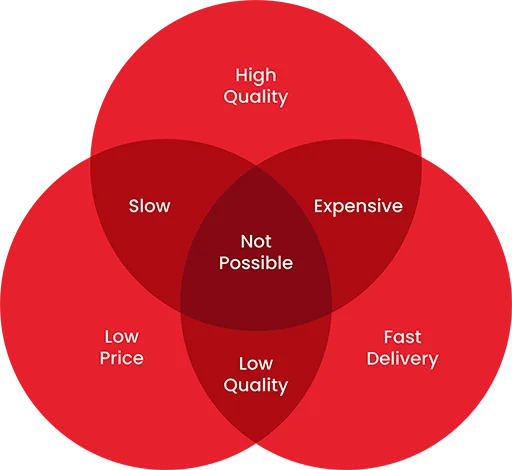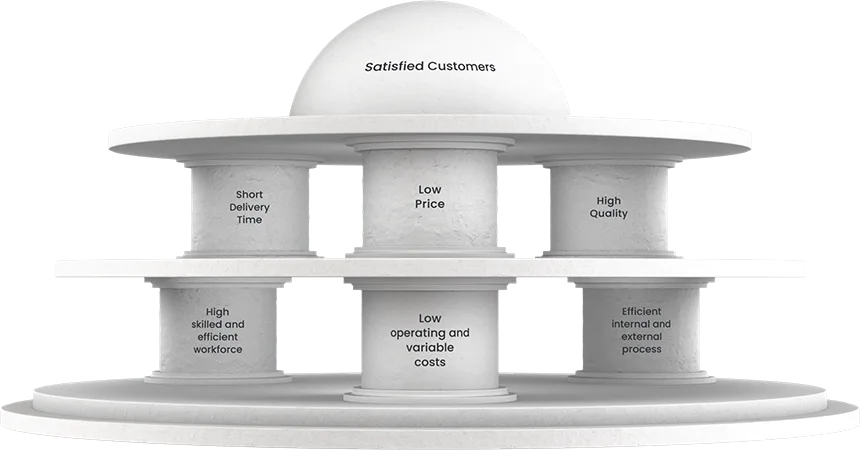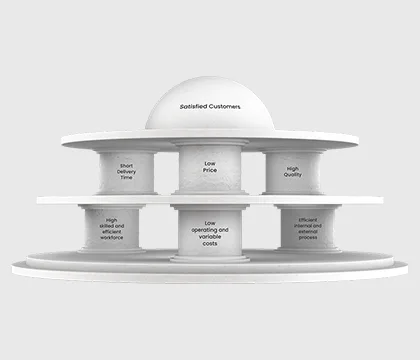Introduction
There are numerous examples of companies that entered an industry and did things in a new and better way than existing players. Notable examples would be Uber (which reorganised and improved the taxi industry for customers), Netflix (which upgraded the entertainment experience), Wikipedia (which revolutionised the way knowledge is assimilated and shared compared to traditional encyclopedias), or Airbnb (which created new linkages between potential rentiers and shelter seekers, thereby dispensing cheap accommodation to travellers). Many of these companies probably sought inspiration for their business models in process optimisation theory.
In 2019, the renowned consulting firm McKinsey published a comprehensive report entitled ‘Introducing the next-generation operating model’ (operating model is a subset of a business model). In this report, McKinsey underlines that the successful business models of the future will use process optimisation theory.
The backbone of our business model is process optimisation theory. Using this theory, we have invented a new business model that is fundamentally different from that used by conventional digital agencies in the UK. It ensures that our customers get high quality, low price, and fast delivery. This combination seems counter-intuitive because the traditional view dictates that you cannot buy high-quality products at low prices in a short delivery time. Nevertheless, there is consensus among process optimisation theorists that high quality can be achieved in short delivery times and at low costs. We at Tiblo, have used process optimisation theory and proved that it is possible to completely rethink the conventional business model for digital agencies and provide high-quality products at low costs in a short time.
One of the founders of Tiblo has an academic education that is a rare combination: he first obtained a master’s degree in engineering, where he primarily worked with process optimisation theories, and then after that, he received a bachelor’s degree in IT development. After completing his education, he persisted in his interest and has practically applied process optimisation theory to many real-world problems. Over the last 15 years, he has built up a good amount of theoretical and practical knowledge about process optimisation. He also has an in-depth understanding of how the theories have been implemented in some of Denmark's largest companies and prominent international companies.
Theoretical and practical knowledge from the field of IT development has been combined with the vast knowledge in process optimisation theory to build The Tiblo Model.
Tiblo’s business model is deeply inspired by the most recognised process optimisation theories such as Lean, Six Sigma, Theory of Constraints, Systems Thinking, BPR (business process reengineering), JIT (just in time), etc. The Tiblo Model is also inspired by the greatest theorists within optimisation theory, such as Edwards Deming, Eli Goldratt, Tahiti Ohno, etc.
This page will explain The Tiblo Model and how our business model fundamentally differs from other digital agencies in the UK. As a forerunner to the explanation, we begin with an overview of two things: (1) how a conventional digital agency works, and (2) the traditional view of the relationship between quality, price, and delivery time.
How a conventional digital agency in the UK works
An exhaustive description of how a conventional digital agency in the UK works will be extremely long. To keep the text manageable, in terms of time, this description touches upon only the most important points where Tiblo's business model differs significantly from a conventional digital agency in the UK.
The conventional agency has one or more offices where employees meet physically and work. This requires that the employees live relatively close to the office. Typically, employees live within a 30 miles radius of the office they work in so that they do not have to spend too much time commuting every day. Speaking in general terms, this means that the agency can only hire people who either live close to its physical office or are willing to relocate.
Often these offices are located in big cities and at upmarket addresses so that they can attract the right employees and send the right signals to their customers. Such offices are usually expensive. Another challenge associated with offices in big cities is that many other companies also need the same employees: programmers, designers, software testers, etc. Companies in the same location constantly fight among themselves for the best employees. Competitive demand for skilled labour in big cities means that the wages conventional agencies pay are high.
Some agencies choose to open branches in countries where salaries are lower than in the UK, say in Poland, Romania, or Belarus. Despite this improvisation, they still face the same challenges: they can only hire employees who live close to their offices, they still have to fight for the best employees with other companies in the area, and they still have to pay a lot of money for offices that need to be located at attractive addresses to attract the right employees.
When a conventional agency needs a new employee, it starts a recruitment process. The recruitment process can be handled by the agency’s HR department or by an external company hired for the work. It typically proceeds as follows:
Step 1
The hiring agency advertises or approaches likely candidates.
Step 2
Candidates submit their applications. They generally have about one month to do so.
Step 3
The agency reads through the applications and shortlists the best three to five candidates for an interview.
Step 4
Interviews begin. Before or during the interview, the candidates may be asked to take a hands-on test (for example, a code test). The test typically takes an hour or two.
Step 5
The agency then holds a second and perhaps a third interview. The agency finally selects the candidate it wants to hire. It typically takes one month from the deadline to apply until the right candidate is found.
Step 6
The candidate terminates her current job and starts working at the agency after serving her notice period. From the time the candidate has been hired until she starts working, it typically takes one to two months, depending on the notice period.
As can be seen, it takes approximately three to four months from the time the agency decides to recruit a new employee until the time the person starts working, which is a relatively long time. In addition, the agency always risks hiring someone who may not be skilled enough for the job. The primary reason for the failure is that the pre-employment testing, in this conventional recruitment process, is not good enough to evaluate a person’s professional skills. Weak testing can lead to sub-standard skill selection.
There is a huge shortage of skilled IT staff in the UK (tech leads, programmers, UX designers, software testers, etc.). This implies that the hiring agencies face difficulties in finding skilled people. Consequently, some agencies may be forced to hire people who are not competent enough for the job requirements.
The high demand for skilled IT staff in the UK has also pushed up wages. Higher salaries for skilled IT professionals keep pushing up project and product prices.
Conventional agencies usually have long delivery times. Besides other reasons, this is also because, in most situations, all current employees are engaged in previous, ongoing projects when new projects arrive. Maintaining bench strength is very expensive in the UK. On the other hand, hiring competent new staff solicits a wait of three to four months. The conventional UK agency has very limited options. It can either increase prices to maintain bench strength, or else it has to make the customer wait a long time for staff to finish ongoing projects or for new hires to arrive.
To conclude, digital agencies in the UK have high expenses (salaries, offices, etc.), which makes them charge relatively high prices for their products. Likewise, the delivery times are often long.
The traditional conception of quality, price, and delivery time
Many people believe that price and quality are related directly: if you want a high-quality product, then its price will inevitably be high, and if you wish to have a low-quality product, then its price can be low. Consequently, they believe that getting a high-quality product at a low price is not possible.
Dr Martin Barnes invented the classic time/cost/quality triangle in 1969. The triangle dictates that quality, cost, and time are interrelated, but in a manner that low prices and short delivery times cannot provide high-quality products.

However, process optimisation theory (Lean, Six Sigma, Systems Thinking, etc.) has been asserting for a long time that this is a complete misconception, that it is possible to produce products of high quality at a fast pace and low costs. This unorthodox feat has been achieved many times by companies around the world using process optimisation theories. With The Tiblo Model, we have once again proved that it is possible to produce digital products of high quality, at low prices, in short delivery times.
What is The Tiblo Model?
At Tiblo, we believe that the most important factor for our success is to have satisfied customers. Satisfying our customers is our overarching main goal. The Tiblo Model is our method for ‘creating’ satisfied customers.
We know that the vast majority of our customers will be satisfied if we can deliver digital products that have: high quality, low price, and short delivery times.
Our main goal is customer satisfaction, while our three sub-goals are to offer digital products of high quality, at a low price, within short delivery times. At the same time, we believe that it is possible to deliver on each of these sub-goals if Tiblo has the following three elements: highly skilled and efficient workforce, low operating and variable costs, and efficient internal and external processes.
To facilitate understanding, we provide (below) a graphic illustration of The Tiblo Model. In Lean theory, the Lean temple is used to illustrate the theory. Walking a similar road, we have also chosen to use a temple to illustrate our Tiblo Model.

As can be seen from the model, (1) a highly skilled and efficient workforce, (2) low operating and variable costs, and (3) efficient internal and external processes, are the foundational elements that facilitate delivering on the three sub-goals: (1) high quality, (2) low price, and (3) short delivery time. Likewise, the three sub-goals are fundamental to the main goal, which is satisfied customers.
The temple will collapse if any single member is removed from the structure. Thus, it will not be possible to have satisfied customers. Therefore, it is essential for us to constantly improve everything in Tiblo's setup to strengthen the three base elements in The Tiblo Model.
How Tiblo works and how it is fundamentally different from other agencies in the UK
Our setup is based on three elements that form the foundation of The Tiblo Model: (1) a highly skilled and efficient workforce, (2) low operating costs, and (3) efficient internal and external processes.
Any comprehensive description of the entire Tiblo setup will be overwhelming and digressive. Instead, we focus only on those sub-elements of Tiblo's setup that differ significantly from the conventional way of running a digital agency in the UK. After describing the relevant sub-elements, we explain how they affect the sub-goals: (1) high quality, (2) low price, or (3) short delivery time.
Work from anywhere
How does it work in TIblo
At Tiblo, we do not have physical offices. Instead, we have a ‘work from anywhere’ policy that offers many benefits. This policy allows our experts to work from wherever they want, be it their homes, a working vacation lodge, a shared office, community space, or something different. The choice is entirely theirs. We believe that an unfettered workforce is a happier workforce, a more creative and productive workforce.
This flexibility allows us to recruit experts from around the world. Space does not limit our choice. We can hire the most appropriate people from any location on the globe. All that an expert aspiring to work for Tiblo needs is an internet connection. Tiblo’s experts have been residents of Canada, Denmark, Bulgaria, India, and Sri Lanka.
How does it affect the sub-goals, and how is this model fundamentally different from other digital agencies in the UK?
Agencies that recruit employees in the UK have a hard time finding competent people because there is a great demand for people with strong IT skills in the UK. Further, within the UK, these agencies can only recruit those people who either live close to the office that has the vacancy or are willing to relocate. Commute time is a serious consideration for potential employees. Therefore, the talent pools available to these agencies are small-sized.
We do not have these problems. We have a huge number of candidates to choose from as we can choose all over the world. We are not limited by the need for candidates having to live close to our offices or in a specific country. We can hire the most appropriate people no matter where they live physically, as long as they have an internet connection. This makes it much easier for us to find experts. Because we can hire the best of the best talents, the products we deliver are of high quality.
Our experts work from home. They save a lot of time on transport every day. This frees them to engage in more exciting and meaningful activities that add value to their lives, spend time with their families and friends, pursue hobbies, etc. Many of our experts have expressed the sentiment that this arrangement gives them more job satisfaction. We believe that the job satisfaction of our experts leads to high quality in their work.
When all our experts work from home, we have no office expenses. This saves us a lot of money every year, and we transfer the benefit to our customers in the form of low prices for our digital products.
Since our experts do not have to waste time and energy on the daily commute, they are relatively less stressed and have more free time at their disposal. In crunch situations, where Tiblo has to make an express delivery, we can tap into this latent time–energy reservoir and provide the ‘overtime’ that helps our company meet its fast delivery commitments.
Recruitment
How does it work in TIblo
There are about 15 distinct work positions at Tiblo, including front-end developer, back-end developer, UX designer, UI designer, software tester, etc.
We have a very comprehensive recruitment setup, which has tested several thousand potential candidates over the last few years. For each job profile, we have between 20 and 300 candidates competing for the vacant position. In most vacancies, there have been close to 300 candidates going through the drills of our recruitment process.
Candidates begin their participation in our recruitment process by taking the following steps:
Step 1
We have developed a comprehensive and subject-specific practical test for each job profile. Candidates interested in a work position need to take this competence test mandatorily. It usually requires between 5 to 15 hours to complete. For certain job profiles, the test time can be longer.
Step 2
Candidates are then required to shoot a 2–10 minute video wherein they walk us through their test solution, highlighting their approach and thought process.
Step 3
Candidates fill in a spreadsheet with information that justifies their suitability for the vacancy: previous experience with specific technologies, educational backgrounds, relevant courses they have taken, the city they live in, etc.
Each candidate provides these three inputs to us. We review the candidate's practical test and the video in detail. Next, we write down what was good and bad in the test. At the same time, we give the candidate’s test performance an overall grade on a scale from zero to ten (zero for bad performance and ten for excellent).
We collate all the information provided by the candidates in Step 3 into a large and combined spreadsheet, alongside records of their test scores. For each candidate, we thus have all the relevant information we need, including a qualitative and quantitative assessment of the candidate’s test. For most of our job positions, this master record (Excel spreadsheet) contains information on around 300 candidates.
Once we have assessed all the candidates, we hold an online interview with those who have performed the best in the test. After the interview, we conduct another quantitative and qualitative assessment of the candidate. After we have held all the interviews, we hire the most appropriate person.
In the future, when we have to hire a new person for a position, we just look at the corresponding combined Excel sheet for the job profile and hire the next most appropriate candidate. We keep testing candidates, so our spreadsheets constantly grow with information on new talented candidates. As mentioned earlier, many of our spreadsheets contain records for over 300 people, so we have information on lots of talented people we can hire in the future.
How does it affect the sub-goals, and how is our setup fundamentally different from other digital agencies in the UK?
As can be seen, the way we recruit new candidates is very different from what conventional digital agencies in the UK do.
Candidates who eventually work for Tiblo are people who have been evaluated through a comprehensive, five to fifteen hours or more, hands-on test. This allows us to assess candidates far more thoroughly than what happens in conventional recruitment processes. Secondly, the pool of candidates who take the test is many times bigger than what any conventional digital agency in the UK evaluates. In most situations, we fill our vacancy with a person who is the most talented in a pool of as large as 300 aspirants. This means that the people we hire are very skilled, which helps ensure that the products we develop are of high quality.
As stated above, we have a set of large spreadsheets with information on potential candidates who can fill most job positions Tiblo may have in the future. We have information on several thousand candidates who have already taken a test and have been assessed both qualitatively and quantitatively. If we need to scale up our workforce at any stage, we can do it very quickly. From the time we decide to hire someone until she starts working for us, it typically takes only seven days. Conventional IT agencies in the UK or elsewhere require three to four months for the onboarding.
We can save a lot of time because we have already tested many candidates. This allows us to scale up the workforce very quickly if need be. This means that we can deliver products in short delivery times to our customers. Quick onboarding facilitates the quick delivery of our projects.
Workforce
How does it work in TIblo
All the experts working for Tiblo are freelancers. They have all been hired through a recruitment process that involves rigorous testing and evaluation. Before being hired, they had to prove that they were among the best that applied (often 300 people).
Our CEO and CTO reside in Denmark. However, the majority of our experts live in India. There are strong reasons why the majority of our experts come from India. There are 1.4 billion people in India, about 20 times UK’s population (68 million). India has a huge mass of skilled IT talents, with good education. Many of these highly skilled IT professionals speak good English. The salaries in India are lower than in the UK.
Some of the world's most outstanding leaders in the Tech industry come from India. Below you can see five of them.
Each tech leader shown above was born in India and studied in universities there. Some of our experts have attended the same universities as these people.
At Tiblo, we only employ skilled experts with many years of practical experience and high education. We do not have any interns or junior people working on our client projects.
We hire all our experts directly and pay the fee to them directly. We do not hire experts through agencies. This approach keeps expenses down as there is no money-siphoning intermediary involved. Secondly, it results in better selection.
The experts we have hired are happy to be working for Tiblo. They have a great deal of freedom to organise their work schedules according to their preferences. In addition, they get opportunities to learn a lot of new stuff as we work with the latest technologies. Our experts express satisfaction in working for us in this special setup.
How does it affect the sub-goals, and how is this fundamentally different from other digital agencies in the UK?
All the experts hired by Tiblo have extensive education and many years of practical experience. They were among the best in the pre-employment tests, for which a large number of candidates appeared. This indicates their high professional competence, including their ability to create products of high quality.
Most of our experts are residents of India, where the cost of living is significantly lower than in the UK: housing prices are lower, the price of food is lower, the tax rate is lower, etc. This means that you can maintain a good standard of living for significantly less money in India than in the UK. All the experts who work for us get a good salary. At the same time, the salary our experts receive is significantly lower than what a person with similar competencies in the UK gets. Wages in India are also lower than those in Eastern Europe (Poland, Romania, Belarus, Lithuania, etc.). Although the salary is lower, the professional level of our experts is as high as what you find at the digital agencies in the UK. Since we have to spend significantly less on salaries, we can sell our products at a very low price.
Conventional digital agencies in the UK usually have some employees on the bench. Sometimes employees have to be benched for short or long periods of time.
This can happen, for example, when an employee has finished a task and is waiting to get started on the next task. Since the employees are permanent employees, employers cannot fire them when they have nothing to do. Employees who do not work on customer projects make no money for the company but must still be paid salaries. The people who work on customer projects must, therefore, also earn money for those employees who are not working on customer projects. Thus, as a customer, you indirectly help cover the agency’s expenses for people not on a customer project. This may cause the prices of your projects to rise.
At Tiblo, we do not maintain a bench of full-time regular employees. Our model works differently. It is more flexible. There are many experts in India and Sri Lanka who have performed very well on our tests and are willing to offer their services as part-time services in a needs-based arrangement. These experts keep working their regular jobs in other companies and associate with Tiblo when asked to do so. We have a large pool of such associates. They are our latent reservoir of skills. Tapping into our latent skills reservoir, we can handle all work-demand fluctuations above our regular minimal demand, including steep peak demands. Our part-time associates are reliable, time-tested associates with high levels of competence and professionalism. They unfailingly ensure that we meet quick delivery targets.
This way, we have almost no expenses for experts who are not working on a client project. This allows us to keep costs down and sell the products cheaper to you.
Once in a while, we meet potential clients who have a biased attitude that IT work done by Indians leads to poor results. This may be, for example, due to the client herself having had IT built by Indians where the project went wrong. It can also be because the client has heard about others who had IT products developed in India that turned out to be poor. And, it is correct that there have been IT products developed by Indians that failed. However, it is our experience that this is not because people from India work in a manner that things go wrong. Things can go wrong anywhere in the world, when the client hires people who are not skilled enough. If the recruitment process one uses is not comprehensive and good enough, then products developed by any sub-standard development team (recruited through weak procedures) have a strong chance of going wrong. Our experience is that it takes a lot of resources and time to find capable people in India. We have a very comprehensive recruitment and testing system, which ensures that the experts we hire from India are capable of delivering high-quality work. We are convinced that the projects that failed were not due to the use of Indians but because the recruitment process was not good enough.
To summarise this part of the discussion, since we use a very efficient recruitment method we do not have a shortage of skilled staff like many conventional agencies in the UK. At very short notice we can hire all the experts we need. This means we can put many experts to work on your project simultaneously. It implies that we can deliver high-quality products in short turn-around times.
Project Management
How does it work in TIblo
When you buy a digital product from Tiblo, you are always assigned a single project manager who will handle your project from start to finish and is responsible for the overall delivery. You will thus never be tossed around between several different managers, each with their area of responsibility.
The project manager will be a person who can speak your language: Danish, Norwegian, Swedish, German, or English.
Your project manager will be an expert on the digital product you are purchasing. She will have the professional skills to make your product herself. For example, if you want an app, your project manager will, mandatorily, have the extensive practical experience and broad theoretical knowledge required for coding apps. At Tiblo, you will never be assigned project managers who are good at project management but do not have practical experience and theoretical knowledge about the digital product you want to buy.
Before we collaborate, we will always meet you physically or online. Later in the process, we primarily connect online unless you want a physical meeting. It is our experience that online meetings are very effective. Through online meetings, we save on transportation and time wastage associated with physical meetings.
We have an agile approach to project management. This means that we would rather hold short meetings frequently than long ones requiring careful scheduling. By having frequent contact, we can showcase our progress and quickly change things if you need adjustments. This way, we avoid wasting many working hours doing something that later requires reworking. Since we want to have short meetings frequently, it is a great advantage to meet online instead of physically. Our effective online meeting culture also allows us to hold meetings at short notice. In addition to reducing costs, this approach promotes faster delivery.
As stated above, your project manager will speak your language: Danish, Norwegian, Swedish, German, or English. During the process, there may be situations where you need to communicate with our experts in face-to-face meetings or through emails. Our experts are good at written and spoken English but cannot handle Danish, Norwegian, Swedish, or German. If you do not want to communicate in English, your project manager will be responsible for the translation, which is completely normal and something we do for many customers. If you can communicate in English, our project manager will save time, and thus the project will be a little cheaper for you.
How does it affect the sub-goals, and how is this fundamentally different from other digital agencies in the UK?
It is tough to find project managers who can understand a customer's business and, at the same time, develop digital products. For example, it is difficult to find a skilled app developer who is also proficient in understanding a customer's business needs. This means that many conventional digital agencies in the UK hire a project manager who is not an expert in developing digital products. This project manager is good at managing projects (handling Excel sheets, schedules, finances, etc.) and understanding the customer’s business needs. A project manager with this limitation becomes an intermediary between the customer and the professional developing the digital product. Her task is to understand the customer's needs and translate them to a professional (programmer, UI designer, etc.).
There are several issues associated with this form of project management. When, as a customer, you ask the project manager questions, she may have difficulties answering them because she needs to consult the professionals working on the project to be able to answer adequately. This means that things take a long time and are expensive as many people often have to be involved in answering your questions. This also means that you cannot use your project manager as a sparring partner as she does not have the necessary technical skills.
As the project manager does not have the necessary technical competencies, she may inadvertently propose solutions to problems during the process, which later prove to be inappropriate. These solutions must subsequently be redone when the professional starts the execution, which is a waste of resources.
The conventional digital agency in the UK can choose to have several professional groups in the client meetings to answer your questions adequately. This, in turn, makes your digital product more expensive as the company will need to deploy more resources for these meetings.
The scenario sketched out above does not play out at Tiblo. We do not have project managers that are not experts in the services/products you will be buying. All our project managers have extensive education and years of practical experience developing the kind of products you want. They are thus equipped to answer most of your questions impromptu. Likewise, you can use them as sparring partners during the project as they have the necessary practical and theoretical knowledge. In this way, we also avoid wasting time and money on situations where we have to redo the work because the project manager suggests some things that later turn out to be inappropriate.
This means that as a customer at Tiblo, you will get a product of higher quality because you get the necessary professional sparring. It also means that the delivery time will be shorter as there is no time wasted waiting for answers from various professionals. In addition, the price will also be lower as there is less wastage in our project management methodology.
Prices
How does it work in TIblo
When you buy a digital product from Tiblo, we always give you a fixed price before we start working on your project. This means that you always know what your finished product costs right at the start. You will not get any unforeseen extra bills. If things prove to be more expensive than we initially expected, we bear the additional expenses.
If you want work done on hourly rates, we can do that. However, 95% of our clients prefer fixed-price agreements. With fixed-price agreements you know the costs before work on the project starts, and your expenditure on the project works out to be cheaper than what you would be paying on an hourly basis.
How does it affect the sub-goals, and how is this fundamentally different from other digital agencies in the UK?
You often hear about IT projects, in the public and private sector, that turned out to be more expensive than expected. The reason for this can be that the customer was not given a fixed price when the project started.
Providing fixed prices for digital products is associated with great uncertainty and risk. That is why many conventional digital agencies in the UK do not want to offer fixed-price projects. Even among those that give fixed prices, many choose to provide high prices to cover the uncertainty and risk in the project. Normally, conventional agencies want to work on hourly rates. The uncertainty and risk are passed on to the customer in this case.
At Tiblo, we choose to carry the uncertainty and associated risk on our shoulders. We work almost exclusively through fixed-price agreements. We have processes and tools that help reduce the risk and uncertainty when we start work on a project. One good example of such a tool would be our interactive prototype. But more importantly, we have the overarching goal of having satisfied customers. We know we can get more satisfied customers by relieving them of the uncertainty, by transferring the risk onto our shoulders. By offering fixed prices, we seek satisfied customers.
Customers usually obtain price quotes from multiple agencies and select the best offer. It is natural. We know we are always in competition with other businesses. That's why we offer low and fixed prices so that we may win the project. As stated earlier, we couple our low and fixed prices with fast delivery times and high quality.
Our fixed-price policy implies that you as a customer will experience greater satisfaction with our work because we relieve you of the uncertainty and associated risk. It means that you never risk signing a project that will eventually turn out to be more expensive than you expected.
Processes
How does it work in TIblo
We are constantly trying to improve our internal and external processes. These improvements are based on recognised process optimisation theory (Lean, Six Sigma, Systems Thinking, JIT, etc.). The optimisations focus on reducing operating costs (including salaries), raising employee satisfaction, improving quality, reducing delivery time, etc.
Describing all our internal and external processes is too large an undertaking. To give an idea, we provide two examples from our processes.
Example 1: As part of our design process, we often develop three different design proposals. Customers receive three concrete design options for their digital products. Customers choose the design they like the best and provide feedback on it. We change the design accordingly, seek further feedback, and keep changing the design until the customer is satisfied. Finally, the customer has a design she is happy with.
Example 2: All the important elements of the digital products we make are checked by at least one person other than the one who made them. An example of this is that almost all code produced in our solutions is reviewed by another person. Likewise, all architecture for our solutions is reviewed by several people.
How does it affect the sub-goals, and how is this fundamentally different from other digital agencies in the UK?
Our approach to customers and way of working is in many ways very different from most conventional digital agencies in the UK. An example of this is the design process mentioned above. Most conventional agencies prefer to charge their customers at hourly rates. This means that the more time the agency spends on creating and customising your design, the costlier the project becomes. As a customer, you may realise that you cannot invest the time required to get your dream design because you are running low on your budget.
Since our customers often get three different designs right at the start, they have more to choose from. The fixed-price agreement means that we continue to change the design until the customer is satisfied. This ensures that our customers do not have to worry about their purses while revising and finalising their designs.
The second example of a process mentioned above is one of our methods for quality assurance. As described above, all of our key elements are checked by multiple people. This results in the high quality of our products.
This text mentions only two examples of our processes. However, all our processes are set up similarly so that they affect the elements of The Tiblo Model positively and we can achieve our objective of having satisfied customers.
Technology choice
How does it work in TIblo
When creating a digital product, there are often many different technologies that can be used. For example, if you need to create a new website, you can do so by coding it from scratch, or by using a CMS system, or doing something completely different. If it is a simple website with few features, it will never be the best solution to code the website from scratch. For this purpose, we can use other technologies that are far more effective.
We always try to use the most efficient technologies for specific tasks. An example of effective technology is Microsoft Xamarin. Microsoft Xamarin makes it possible to develop apps in half the time compared to the time it takes when working with traditional technologies. We are among the digital agencies in Northern Europe that are the most experienced in using Microsoft Xamarin.
How does it affect the sub-goals, and how is this fundamentally different from other digital agencies in the UK?
By using the most efficient technologies, we can make high-quality products faster and cheaper. This means that we can provide high-quality products in a short delivery time and at low prices.

Conclusion

As can be seen, our business model is fundamentally different from that of conventional digital agencies in the UK. Our model is structured to deliver digital products of high quality, at low prices, in short delivery times. Our work, over the past few years, has demonstrated that The Tiblo Model is a successful model.
If you have questions about The Tiblo Model or would like us to elaborate something, you are most welcome to contact us.
TESTIMONIALS
Read small excerpts of what companies and individuals have said about their collaboration with us.
Tiblo developed our bespoke loyalty app. Customers can use the app to gain benefits when shopping in one of our 700 physical stores in Europe. Tiblo has functioned as a close and valuable sparring partner throughout the process, maintaining constant support from the idea stage till the app launch and beyond. The cooperation with Tiblo has been satisfyingly productive. We are delighted with the high quality of work delivered promptly and at a fair price.
Allan Svinth
Director and CFO

Danske Idræt
Danske Idræt is an independent sports association for employees of Danske Bank in Denmark, with approximately 2,000 members. We needed a new digital platform (mobile app and administration module) to offer our association members a better experience and, at the same time, to simplify the administrative work for our volunteers. Tiblo has been a competent partner while working with us on this new digital platform. Tiblo understood our requirements and took the time needed to understand our organization and pains. We are delighted with the collaboration and the high quality work, offered at a good price.
Christina Jørgensen
Vice-chairwoman

*The picture of Christina Jørgensen is a dummy. The correct picture will be uploaded soon.



